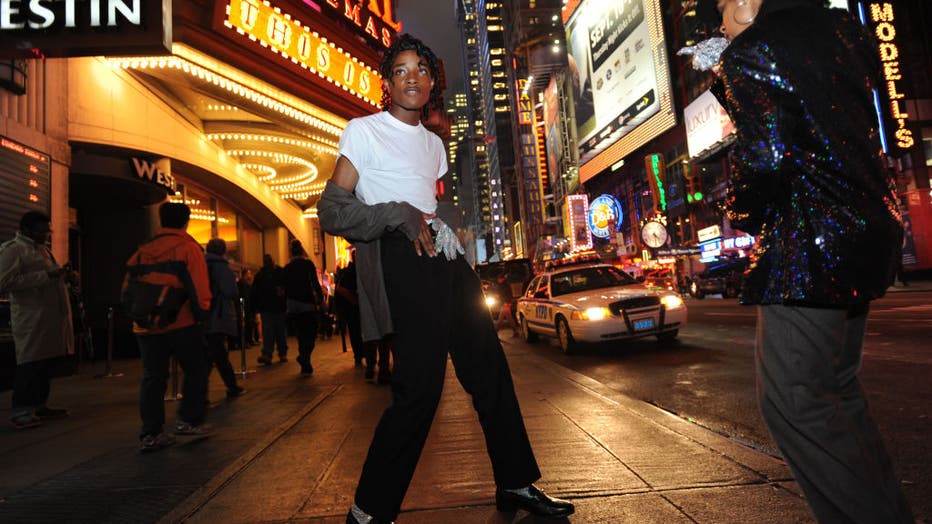Jordan Neely death: NYC Mayor Adams pledges more mental health support
NEW YORK - New York City Mayor Eric Adams said the death of Jordan Neely at the hands of a fellow subway rider was "a tragedy that never should have happened" and pledged to do more to help people experiencing mental health crises.
"My heart goes out to Jordan’s family, who is suffering great pain and uncertainty about the circumstances of his death," Adams, a former police officer who was criticized for his initial muted response to Neely's death, said.
Death of Jordan Neely
Neely was reportedly having a mental breakdown back on May 1 on a northbound ‘F’ train – behaving erratically and pacing back and forth – when video showed 24-year-old Marine veteran Daniel Penny put him in a chokehold, with two others helping to hold him down.
Video of the encounter quickly went viral.
The medical examiner’s office ruled Neely’s death a homicide caused by compression on the neck.
- RELATED: What we know about the death of Jordan Neely
- RELATED: Protesters clash with police, jump on subway tracks

Protesters clash with police, demand justice for Jordan Neely
New Yorkers protesting the chokehold death of Jordan Neely jumped on subway tracks and briefly disrupted operations Saturday night.
Penny was briefly taken into custody, questioned and then released, sparking outrage across the city. Many took their anger out into the streets.
Adams' initial response
Adams' first response to the fatal encounter was to decline to condemn Penny and to reference the rights of subway riders to take action in certain situations.
"I was a former transit police officer, and I responded to many jobs where you had a passenger assisting someone," Adams said after Neely's death was first reported.

Mayor Adams responds amid outrage over homeless man's death
FOX 5 NY's Briella Tomassetti has the story.
Neely’s family issued a statement earlier this week criticizing the mayor’s response.
MORE: Adams responds amid outrage over homeless man's death
"The mayor has chosen a side," said Donte Mills, an attorney hired by Neely’s aunt and father. "For him to put that forward as an excuse for Mr. Penny is very irresponsible, it’s not acting in good faith as a mayor, and it’s disrespectful to the family, who is suffering a loss."
Wednesday address
Speaking in a livestream address Wednesday from City Hall, Adams sought to counter the charge that he did not care about Neely.
He noted Neely shared a name with his own son, Jordan Coleman, and said all New Yorkers "must work together to do more for our brothers and sisters struggling with serious mental illness."
A message seeking comment on Adams' speech was left with Mills, Neely's family's attorney.
Trying to steer mentally ill homeless people into shelter and treatment has been a priority for Adams, a Democrat, since he took office at the beginning of 2022.
RELATED: Mayor Adams discusses controversial new approach to NYC homeless
Adams announced a plan in November to hospitalize some severely mentally ill people involuntarily, citing the city's "moral obligation to act."
The approach was criticized by some civil liberties advocates as too invasive, but Adams said Wednesday the city has "managed to bring many people in crisis to the hospital who desperately needed care" in recent months.
In a statement responding to Adams' comments, the New York Civil Liberties Union said, "We know that forcing anyone into treatment is a recipe for failure."
The organization added, "The mayor is right that there are more Jordan Neelys in our city. They deserve to get back on their feet, not be controlled, criminalized, or killed."
Adams urged New York state lawmakers to pass legislation that would smooth the path for getting homeless mentally ill people into treatment.
Who was Jordan Neely?
Neely was not the first member of his family to die violently. His mother, Christie Neely, disappeared in 2007 and her body was found stuffed in a suitcase in the Bronx.
Christie Neely's boyfriend was charged with strangling her, and Jordan testified at the boyfriend's murder trial.

Jordan Neely is pictured before going to see the Michael Jackson movie outside the Regal Cinemas in Times Square in 2009. (Andrew Savulich/New York Daily News/Tribune News Service via Getty Images)
Neely's mental health began deteriorating at some point after that, and Adams said the young man "interacted with many city agencies and community-based organizations and providers" over the years.
"Those efforts were not enough, and we must find ways to strengthen our system starting with investigation and accountability," Adams said.
Adams said he would bring together the leaders of the five organizations that contract with the city to provide homeless outreach services for a summit next week on improving outcomes for people with serious mental illness.
KAREN MATTHEWS, with the Associated Press, helped contribute to this report.


